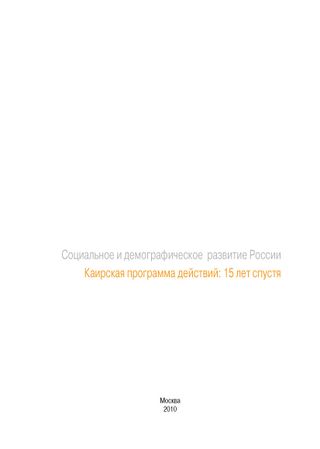?
Особенности российской модели рождаемости
Гл. 6. С. 77–87.
In book

Zayonchkovskaya Z., Zakharov S. V., Zubarevich N., Kvasha E. A., Ovcharova L., Pishnyak A., Покровский В., Sakevich V. I., Сухова А. С., Tyndik A., Уварова Е., Фролова О., Kharkova T. L. М.: Права человека, 2010.
Ovcharova L., В кн.: Население постсоветских стран: тенденции, прогнозы, межпоколенческие трансферты.: М.: Прометей, 2024.
Вступление к монографии ...
Added: January 21, 2026
Springer Nature Singapore Pte Ltd. , 2025.
This book presents a comprehensive examination of the complex journey toward achieving environmental resilience in the twenty-first century. It brings together leading voices from various fields to showcase the challenges and promising solutions in sustainability and green futures. Organized into thematic divisions, each chapter presents a different facet of environmental resilience, offering incisive analysis, creative ...
Added: January 20, 2026
Aleksandrova I., Milshina Y., , in: Artificial Intelligence Enabled Real Time Environmental Monitoring.: Springer, 2026. Ch. 10 P. 199–229.
Artificial intelligence is increasingly becoming a valuable tool in environmental science, providing significant benefits in the processing of high-volume datasets, improving predictive models, and better enabling the efficient monitoring of ecosystems. Its ability to identify patterns, automate tedious tasks, and facilitate data-driven decision-making makes it of extreme value in tackling climate change, biodiversity loss, and ...
Added: January 19, 2026
Новосибирск: ИПЦ НГУ, Новосибирск, 2025.
В сборнике представлены доклады участников Международного форума «Сибирь в стратегическом цивилизационном повороте: глобальное и региональное измерения», который прошел в Новосибирске 25-28 сентября 2025 г. Книга рассчитана на специалистов в областях социологии, философии, истории, а также всех интересующихся социально-гуманитарной проблематикой. Тексты представлены в авторской редакции. ...
Added: January 19, 2026
Porosenkov G., Селезнева В. Н., Информационное общество 2025 № 6 С. 60–66
This review synthesizes the functions of external enterprise training conducted by IT companies, targeting non-employee students. Key functions include enhancing employer branding, recruiting talent, promoting high-tech products, and improving the accessibility and quality of IT education. ...
Added: January 18, 2026
Sergunin A. A., Лагутина М. Л., В кн.: Полярные чтения – 2024. Северный морской путь: история и перспективы развития.: М.: Паулсен, 2025. С. 206–219.
В данной статье предпринята попытка проанализировать, заложена ли концепция «синей экономики» (СЭ) в стратегическом мышлении и планировании России в отношении Северного морского пути (СМП) и может ли СМП использоваться в качестве движущей силы устойчивого развития Российской Арктики. Данный анализ преследует три конкретные исследовательские цели: во-первых, изучить российскую правовую базу и концептуальные документы по развитию СМП. Во- вторых, объяснить, каким ...
Added: January 17, 2026
Sergunin A. A., Вестник Сургутского государственного педагогического университета 2025 № 6 С. 193–206
В данном исследовании рассматривается внедрение модели «синей экономики» в развитие Северного морского пути (СМП) в конце XX-начале XXI вв. В число конкретных исследовательских задач входит, во‑первых, изучение эволюции российской политики в отношении СМП на протяжении последних 20 лет, включая развитие её правовой и концептуальной базы, с точки зрения принципов «синей экономики». Во-вторых, объяснение, каким образом имплементация Полярного кодекса Международной морской ...
Added: January 13, 2026
Demekhina A., Milshina Y., , in: Artificial Intelligence Enabled Real Time Environmental Monitoring.: Springer, 2026. P. 253–281.
Added: January 13, 2026
Durasova A., М.: ИНФРА-М, 2026.
Thе book is dedicated to non-financial reporting and responsible investment practices within the context of sustainable development. It examines international disclosure standards, methodologies for assessing ESG factors, regulatory initiatives, as well as procedures for the verification and audit of non-financial data.
The content aligns with the requirements of the latest generation of Russian federal state educational ...
Added: January 11, 2026
Ustyuzhanin V., Демографическое обозрение 2025 Т. 12 № 4 С. 100–122
Formal demographic analysis, including the construction of life tables, standardization of indicators, decomposition of changes, and modeling of demographic processes, requires complex calculations and data manipulation. Despite the advances in methods, many of them have not yet been implemented as ready-to-use, convenient tools in modern statistical environments. To address this issue, we present the demor ...
Added: December 30, 2025
Zykov S. V., Springer, 2026.
This book focusses on real-world practitioner’s guidance in crisis management of digital product development. This includes monitoring, predicting, preventing and agile responding to critical situations by systematically applying resilient patterns and practices. This book introduces a thoroughly integrated toolbox of patterns and practices for sustainable crisis management, each individual component of which was carefully selected ...
Added: December 30, 2025
Vasilyeva R., Sohag K., Hammoudeh S., Foresight and STI Governance 2023 Vol. 4 No. 17 P. 54–67
The issue of bringing outsider regions closer to leaders in conditions of unequal distribution of assets in order to establish sustainable development is a big task, both on the part of the government and of the companies as well. The authors of the article raise the question of the choice of distribution mechanisms and their ...
Added: December 26, 2025
Filosofova T. G., Сырцов Д. Н., Токанов И. Г., Государственное и муниципальное управление. Ученые записки 2025 № 4 С. 170–180
Introduction. Agricultural products and their processing industries are a source of human livelihood and determine the socioeconomic development and well-being of any country. Russia is one of the countries where flax has been a key agricultural crop and export item for centuries.
Purpose. To identify the prerequisites and opportunities for developing flax and flax-processed product production, ...
Added: December 12, 2025